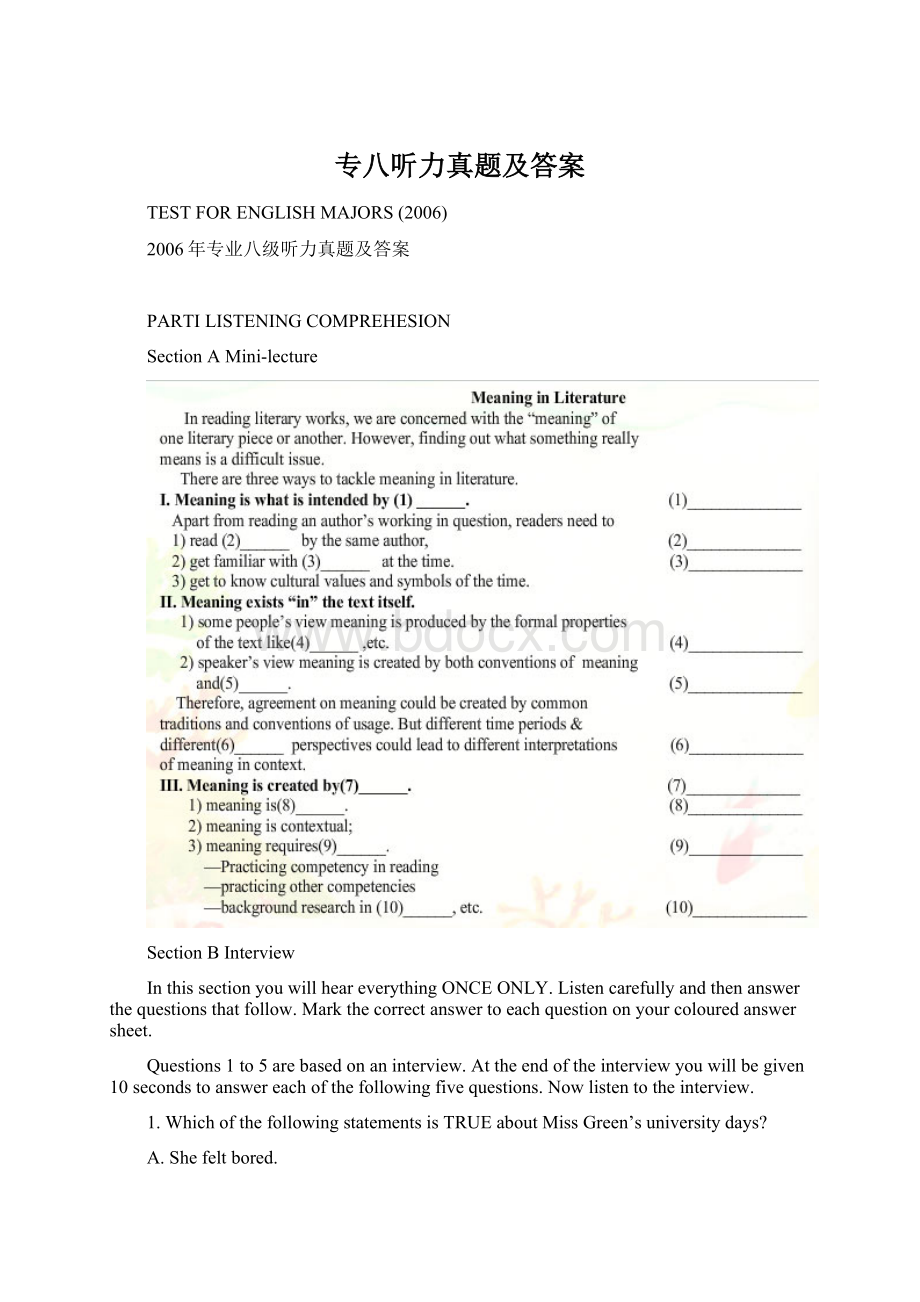专八听力真题及答案.docx
《专八听力真题及答案.docx》由会员分享,可在线阅读,更多相关《专八听力真题及答案.docx(8页珍藏版)》请在冰豆网上搜索。

专八听力真题及答案
TESTFORENGLISHMAJORS(2006)
2006年专业八级听力真题及答案
PARTILISTENINGCOMPREHESION
SectionAMini-lecture
SectionBInterview
InthissectionyouwillheareverythingONCEONLY.Listencarefullyandthenanswerthequestionsthatfollow.Markthecorrectanswertoeachquestiononyourcolouredanswersheet.
Questions1to5arebasedonaninterview.Attheendoftheinterviewyouwillbegiven10secondstoanswereachofthefollowingfivequestions.Nowlistentotheinterview.
1.WhichofthefollowingstatementsisTRUEaboutMissGreen’suniversitydays?
A.Shefeltbored.
B.Shefeltlonely.
C.Shecherishedthem.
D.Thesubjectwaseasy.
2.WhichofthefollowingisNOTpartofherjobwiththeDepartmentofEmployment?
A.Doingsurveysatworkplace.
B.Analyzingsurveyresults.
C.Designingquestionnaires.
D.Takingapsychologycourse.
3.AccordingtoMissGreen,themaindifferencebetweentheDepartmentofEmploymentandtheadvertisingagencyliesin
A.thenatureofwork.
B.officedecoration.
C.officelocation.
D.workprocedures.
4.WhydidMissgreenwanttoleavetheadvertisingagency?
A.Shefeltunhappyinsidethecompany.
B.Shefeltworktheretoodemanding.
C.Shewasdeniedpromotioninthecompany.
D.Shelongedfornewopportunities.
5.HowdidMissGreenreacttoaheavierworkloadinthenewjob?
A.Shewaswillingandready.
B.Shesoundedmildlyeager.
C.Sheabitsurprised.
D.Shesoundedveryreluctant.
SECTIONCNEWSBROADCAST
InthissectionyouwillheareverythingONCEONLY.Listencarefullyandthenanswerthequestionsthatfollow.Markthecorrectanswertoeachquestiononyourcolouredanswersheet.
Questions6and7basedonthefollowingnews.Attheendofthenewsitem,youwillbegiven10secondstoanswereachofthetwoquestions.Nowlistentothenews.
6.Themanstoletheaircraftmainlybecausehewantedto
A.destroytheEuropeanCentralBank.
B.haveaninterviewwithaTVstation.
C.circleskyscrapersindowntownFrankfurt.
D.rememberthedeathofaUSastronaut.
7.WhichofthefollowingstatementsaboutthemanisTRUE?
A.Hewasa31-year-oldstudentfromFrankfurt.
B.Hewaspilotingatwo-seathelicopterhehadstolen.
C.Hehadtalkedtoairtrafficcontrollersbyradio.
D.HethreatenedtolandontheEuropeanCentralBank.
Question8isbasedonthefollowingnews.Attheendofthenewsitem,youwillbegiven10secondstoanswerthequestion.Nowlistentothenews.
8.Thenewsismainlyaboutthecitygovernment’splanto
A.expandandimprovetheexistingsubwaysystem.
B.buildundergroundmallsandparkinglots.
C.preventfurtherlandsubsidence.
D.promoteadvancedtechnology.
Questions9and10arebasedonthefollowingnews.Attheendofthenewsitem,youwillbegiven10secondstoanswereachofthetwoquestions.Nowlistentothenews.
9.Accordingtothenews,whatmakesthiscreditcarddifferentfromconventionalonesis
A.thatitcanheartheowner’svoice.
B.thatitcanrememberapassword.
C.thatitcanidentifytheowner’svoice.
D.thatitcanremembertheowner’sPIN.
10.ThenewlydevelopedcreditcardissaidtosaidtohaveallthefollowingEXCEPT
A.switch.
B.battery.
C.speaker.
D.built-inchip.
听力原文Part1,ListeningComprehension
SECTIONAMINI-LECTURE
Goodmorning!
Intoday'slectureweshalldiscusswhatmeaningisinliterary,works.Whenwereadnovels,poems,etc.,weinvariablyaskourselvesaquestion—thatis,whatdoesthewritermeanhere?
Inotherwords,weareinterestedinfindingoutthemeaning.Butmeaningisadifficultissueinliterature.Howdoweknowwhataworkofliteratureissupposedtomeanorwhatitsrealmeaningis?
I'dliketodiscussthreewaystoexplainwhatmeaningis.
No.1,meaningiswhatisintendedbytheauthor.(Q1)
No.2,meaningiscreatedbyandcontainedinthetextitself.
AndNo.3,meaningiscreatedbythereader.
Now,let'stakealookatthefirstapproach—thatis,meaningiswhatisintendedbytheauthor.Doesaworkofliteraturemeanwhattheauthorintendedtomean?
Andifso,howcanwetell?
Ifalltheevidencewehaveisthetextitselfandnothingelse,wecanonlyguesswhatideastheauthorhadaccordingtoourunderstandingofliteratureandworld.Inordertohaveabetterideaofwhatonepar¬ticularauthormeansinoneofhisworks;Isuggestthatyoudothefollowing:
First,gotothelibraryandreadotherworksbythesameauthor.(Q2)
Secondgettoknowsomethingaboutwhatsortofmeaningsseemtobecommoninliteraryworksinthatparticulartraditionand.atthattime.Inotherwords,weneedtofindoutwhattheliterarytrendswereinthosedays.(Q3)
Andlast,gettoknowwhatweretheculturalvaluesandsymbolsofthetime.Iguessyoucanunderstandtheauthor'smeaningmuchmoreclearlyafteryoudotherelatedbackgroundresearch.
Now,let'smoveontothesecondapproachtomeaning—thatis,meaningiscreatedbyandcon¬tainedinthetextitself.Doesthemeaningexistinthetext?
Somescholarsarguethattheformalprop¬ertiesofthetextlikegrammar,diction,usesofimageandsoonandsoforth,containandproducethemeaning,(Q4)sothatanyeducatedorcompetentreaderwillinevitablycometomoreorlessthesameinterpretationasanyother.As.farasIamconcerned,themeaningisnotonlytobefoundintheliterarytraditionsandgrammaticalconventionsofmeaningbutalsointheculturalcodeswhichhavebeenhandeddownfromgenerationtogeneration.(Q5)Sowhenweandotherreaders,inclu¬dingtheauthoraswell,aresaidtocomeupwithsimilarinterpretations.Thatkindofagreementcouldbecreatedbycommontraditionsandconventionsofusage,practiceandinterpretation.Inotherwords,wehavesomekindofsharedbasesforthesameinterpretation,butthatdoesnotmeanthatreadersagreeonthemeaningallthetime.Indifferenttimeperiods,withdifferentculturalperspec¬tives,includingclass,beliefandworldview,readers,Imeancompetentreaders,canarriveatdif¬ferentinterpretationsoftdxts:
(Q6)Someaninginthetextisdeterminedbyhowreadersseeit.Itisnotcontainedinthetextinafixedway.
Now,thethirdapproachtomeaning—thatis,meaningiscreatedbythereader.(Q7)Doesthemeaningthenexistinthereader'sresponse?
Inasense,thisisinescapable.Meaningexistsonlyinsofarasitmeanstosomeone,andliteraryworksarewritteninordertoevokesetsofresponsesinthereader.Thisleadsustoconsiderthreeessentialissues.
Thefirstis—meaningissocial—(Q8)thatis,languageandconventionsworkonlyasharedmeaningandourwayofviewingtheworldcanexistonlyasharedorsharable.Similarly,whenwereadatext,weareparticipatinginsocialorculturalmeaning,soaresponsetoapieceofliteraryworkisnotmerelyanindividualthingbutispartofcultureandhistory.
Second,meaningiscontextual.Ifyouchangethecontext,youoftenchangethemeaning.
Andlast,meaningrequiresreadercompetency.(Q9)Textsconstructedasliteraturehavetheirownwaysofexpressionsorsometimeswesaystyles.Andthemoreweknowofthem,themorewecanunderstandthetext.Consequently,thereisinregardtothequestionofmeaning;thematterofreadercompetencyasitiscalledtheexperienceandknowledgeofcomprehendingliterarytexts.Yourprofessorsmightinsistthatyoupracticeandimprovecompetencyinreadingandtheymightalsoinsistthatyouinterpretmeaninginthecontextofthewholework.Butyoumayhavetolearnothercompe¬tenciestoo.Forinstance,inreadingMulkRajAnand'sTheUntouchables'youmighthavetolearnwhatthesocialstructureofIndiawaslikeatthattime,whattraditionsofwritingwereinpracticeinIndiaintheearly1930s,whatpolitical,culturalandpersonalinfluencesMulkRajAnandcameun¬derwhenconstructingtheimaginativeworldoftheshortnovel.(Q10)Ok,youmayseethatthisi¬deathatmeaningrequirescompetencyinreadinginfactbringsusbacktothehistoricallysituatedun¬derstandingsofanauthorandhisworksaswementionedearlierinthislecture,todifferentconven¬tionsandwaysofreadingandwritingandtothepointthatmeaningrequiresanegotiationbetweenculturalmeaningsacrosstime,culture,class,etc.Asreaders,youhaveinfactacquiredagooddealofcompetencyalreadybutyoushouldacquiremore.Theessentialpointofthislectureisthatmean¬inginliteratureisaphenomenonthatisnoteasilylocated,thatmeaningishistorical,socialandde¬rivedfromthetraditionsofreadingandthinkingandunderstandingoftheworldthatyouareeducatedabout.Thankyouforyourattention!
SECTIONBINTERVIEW
Interviewer:
Well,Iseefromyourresume,MissGreen,thatyoustudiedattheuniversitycollege.Howdidyoufindthere?
MissGreen:
Ihadagreattime.TheteachingtherewasgoodandImadealotoffriends.Thepsy¬chologydepartmentwasagreatplacetobe.(Q1)
Interviewer:
Howcomeyouchosepsychology?
MissGreen:
Well,atfirstIdidn'thaveanyclearideaofwhatIwantedtodoafteruniversity.IguessI'vejustalwaysbeeninterestedinpeopleandthewaytheyact.Iwantedtoknowwhypeoplethinkandactthewaytheydo.It'safascinatingarea.
Interviewer:
Andwhatwasthecourselike?
.
MissGreen:
Good.Theteacherswereallreallyniceandtheyhadthespecialapproachtoteaching.Youknowtheydidn'tjustgiveuslecturesandtellustoreadbooksliketheymightdoinsomemoretraditionalplaces.Thewholecoursewasbasedontheproblem-solvingap¬proach.Youknowtheydescribedapai-ticularsituationtousandwediscusswhatmighthappen.Andafterthatwedosomereadingand